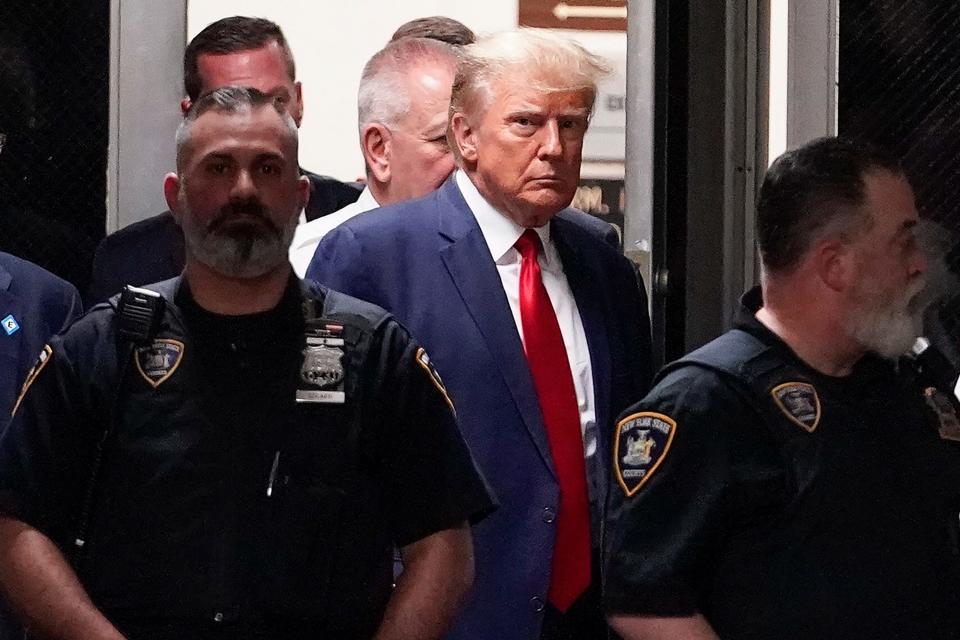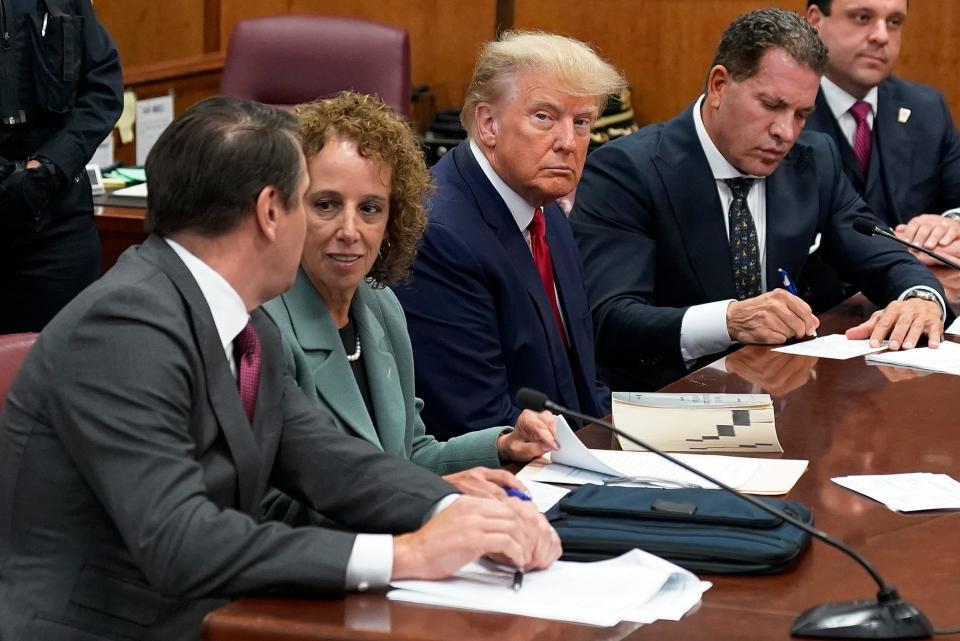Can Trump run for president while on trial? Welcome to the new American dilemma ∣ Mike Kelly
- Oops!Something went wrong.Please try again later.
Imagine this scenario:
It’s April 2024. The presidential primary season is in full swing. Donald Trump leads the Republican field by a substantial margin and is dominating the cable news cycle — just as he did in 2016 and 2020.
But suddenly Trump’s campaign needs a day off from campaigning. He has a court date in New York. Days later, he has another court appearance in Georgia and perhaps more dates in federal courts in Washington, D.C.
And so on.
What was once unimaginable — perhaps surreal — has become a sobering possibility: Trump’s real legal schedule is about to collide head-on with a very real election process and his all-too-real campaign for president again.
The arraignment by the former president earlier this week in New York City was certainly precedent-setting in its own right. No president — active or former — had ever been charged with a felony.
But Trump’s presidential candidacy and his indictment by a Manhattan grand jury on 34 felony charges that each carry four-year prison terms also set in motion a whole other set of precedent-setting scenarios.
In 2016, Trump transformed U.S. politics. Now, experts say, he is about to do it again, running for president as a criminal defendant — perhaps even facing several criminal trials during the campaign season, with wide-ranging charges in several locations. This could be the political version of "everything, everywhere, all at once."
All at once.
To say that such a set of events would be out of the ordinary is an understatement. The most vexing mystery here is what will this do to the nation, its politics and the actual running of government.
The short answer: No one really knows.
“A lot of crazy stuff that has gone on in presidential campaigns in the past,” said Rutgers political science professor Ross K. Baker. “But there has never been anything like this.”
Baker predicted that America may come face-to-face with the possibility of a presidential candidate dealing with a “cascade of legal problems.” But Baker and many other political observers — Trump supporters and critics alike — say they don’t believe the former president will drop out of the 2024 presidential race even if he is convicted of charges that he allegedly violated New York election and tax laws in paying hush money to a former porn actress with whom he allegedly engaged in a sexual affair.
“I think he’ll play the martyr card,” Baker said. “He plays that card very well. And it will solidify support among his supporters who will follow him into the jaws of hell.”
More Mike Kelly: The case against Trump is hardly small or petty. Here's why
As for normal policy debates and basic government functions, Baker added: “The real meat of politics will just get shoved aside in the mind of the public.”
In the days before his indictment on those charges by a Manhattan grand jury, Trump not only dismissed the idea of dropping out of the presidential race, but bragged that his legal problems would boost his candidacy and poll numbers.
“I wouldn’t even think about leaving,” Trump told reporters before speaking last month to a supportive crowd at the Conservative Political Action Conference in Maryland. “Probably it will enhance my numbers.”
Trump’s legal problems extend far beyond New York.
He is the subject of at least two federal investigations — one for his alleged misuse of classified records and another for his alleged role in the Jan. 6, 2021 attack on the U.S. Capital.
In addition, local prosecutors in Georgia are investigating Trump’s reported efforts to interfere with voting in the state during the 2020 presidential election.

And, finally, later this month, Trump faces a civil defamation suit in federal court in Manhattan that stems from his alleged rape years ago of a woman at the Bergdorf Goodman department store in Manhattan. Also, New York state authorities are continuing to probe Trump's business affairs.
Such a series of potentially knotty legal quandaries raises yet another question: What if Trump wins the presidency again and is back in the White House, perhaps convicted of a crime, perhaps still facing unresolved criminal and civil charges in a variety of cases, perhaps juggling even more trial dates?
What then?
Would Trump, while president, be immune from those charges and trials that were filed before taking office? Would he have to balance his Oval Office schedule with the needs of a judge and jury – and perhaps a jail sentence and court appeals? And suppose Trump is convicted in the Manhattan trial next spring and sentenced to prison before the 2024 presidential election? And what about future charges? How are they resolved?
A Trump candidacy would “suck all of the oxygen out of the room,” said Micah Rasmussen, director of the Rider University Rebovich Institute for New Jersey Politics. “There would be no room to talk about anything else, especially important policy issues.”
As for Trump actually serving as president after a court conviction or amid continuing criminal investigations, Rasmussen suggested that government would likely come to a standstill.
“We would not be talking about anything else,” Rasmussen said. “And we would not be dealing with any real issues.”
Rasmussen compared the possibility of a White House engulfed in criminal probes to his tenure in Trenton when he served as press secretary to New Jersey Gov. James McGreevey, a Democrat who was the subject of several investigations including one involving the governor’s alleged sexual affair with an Israeli government official, Golan Cipel.

Faced with mounting criticism about his ties to Cipel, McGreevey resigned in 2004, acknowledging that he was gay. But McGreevey’s problems — legal and political — paled in comparison to those now facing Trump. Nonetheless, the impact of multiple investigations took a toll on the functions of the McGreevey administration, Rasmussen said.
“It was very difficult to have conversations inside the administration back then,” Rasmussen noted. “I suspect the same would be true with a Trump administration that was being investigated.”
The U.S. Constitution does not specifically prohibit criminals — even those behind bars — from running for president.
In 1920, Eugene V. Debs, who was serving a 10-year sentence in a federal prison for violating the espionage act, ran for president as the Socialist Party candidate. He lost but nevertheless garnered nearly 1 million of some 26 million votes that were cast.
The Constitution only stipulates that a president must be born in the United States, be at least 35 years old and be a resident here for at least 14 years.
In a recent essay about Trump’s legal problems, published on the Public Broadcasting website, Stefanie Lindquist, a law professor at Arizona State University, wrote that “because the Constitution does not require that the president be free from indictment, conviction or prison, it follows that a person under indictment or in prison may run for office and may even serve as president.”
Such would be the “prevailing legal standard that would apply to former President Trump,” Lindquist wrote. “The fact of his indictment and potential trial is irrelevant to his qualifications for office under the Constitution.”
In 1973, amid the Watergate scandal that eventually led to President Richard Nixon’s resignation in the face of a likely impeachment and possible criminal charges, the Department of Justice looked at the question of whether a president could continue to serve if indicted or even imprisoned.
“The spectacle of an indicted President still trying to serve as Chief Executive boggles the imagination,” the Justice Department’s attorneys concluded in a memo.
The Justice Department revisited the issue in 2000 in the wake of President Bill Clinton’s impeachment. As in 1973, the Justice Department again concluded that a president could not be indicted or convicted while serving in office.
But neither the 1973 nor the 2000 memos addressed the question now raised by Trump’s candidacy: Can a president who was indicted or convicted before taking office continue to serve?
The Constitution’s 25th Amendment, which addresses removal of an incapacitated president, does not mention legal problems or imprisonment. But the 1973 and 2000 Justice Department memos both note that “the physical confinement of the chief executive following a valid conviction would indisputably preclude the executive branch from performing its constitutionally assigned functions.”
Practically speaking, a president in prison can’t take a ride on Air Force One to comfort victims of a natural disaster.
Which means, the U.S. Supreme Court would likely have to step in.
Such a possibility, while daunting and even surreal, would likely freeze most government functions.
Imagine Congress trying to set a debt ceiling, debate immigration reform or wrestle with questions of supporting the war in Ukraine as America convulses over whether a president facing prison should still be in office?
Rutgers historian David Greenberg said such possibilities underscore another very real concern — that American politics, with all its bitter partisanship, have reached a “very fluid and volatile time.”
But Greenberg, who is writing a book on civil rights activist John Lewis, predicted that Trump would try to ride through the political and legal storms, no matter how bad they became.
“Trump doesn’t seem like the guy who would fold his campaign just because he’s on trial,” Greenberg said. “On the contrary, he’ll find a way to campaign in between court appearances. He’ll rely on press conferences and social media if he has to.”
In the end, Greenberg added, “the media will lap it up. He won’t lack for a pulpit or for attention.”
Mike Kelly is an award-winning columnist for the USA TODAY Network as well as the author of three critically acclaimed non-fiction books and a podcast and documentary film producer. To get unlimited access to his insightful thoughts on how we live life in the northeast, please subscribe or activate your digital account today.
Email: kellym@northjersey.com
This article originally appeared on NorthJersey.com: Trump's indictment presents unique electoral and governance problems

